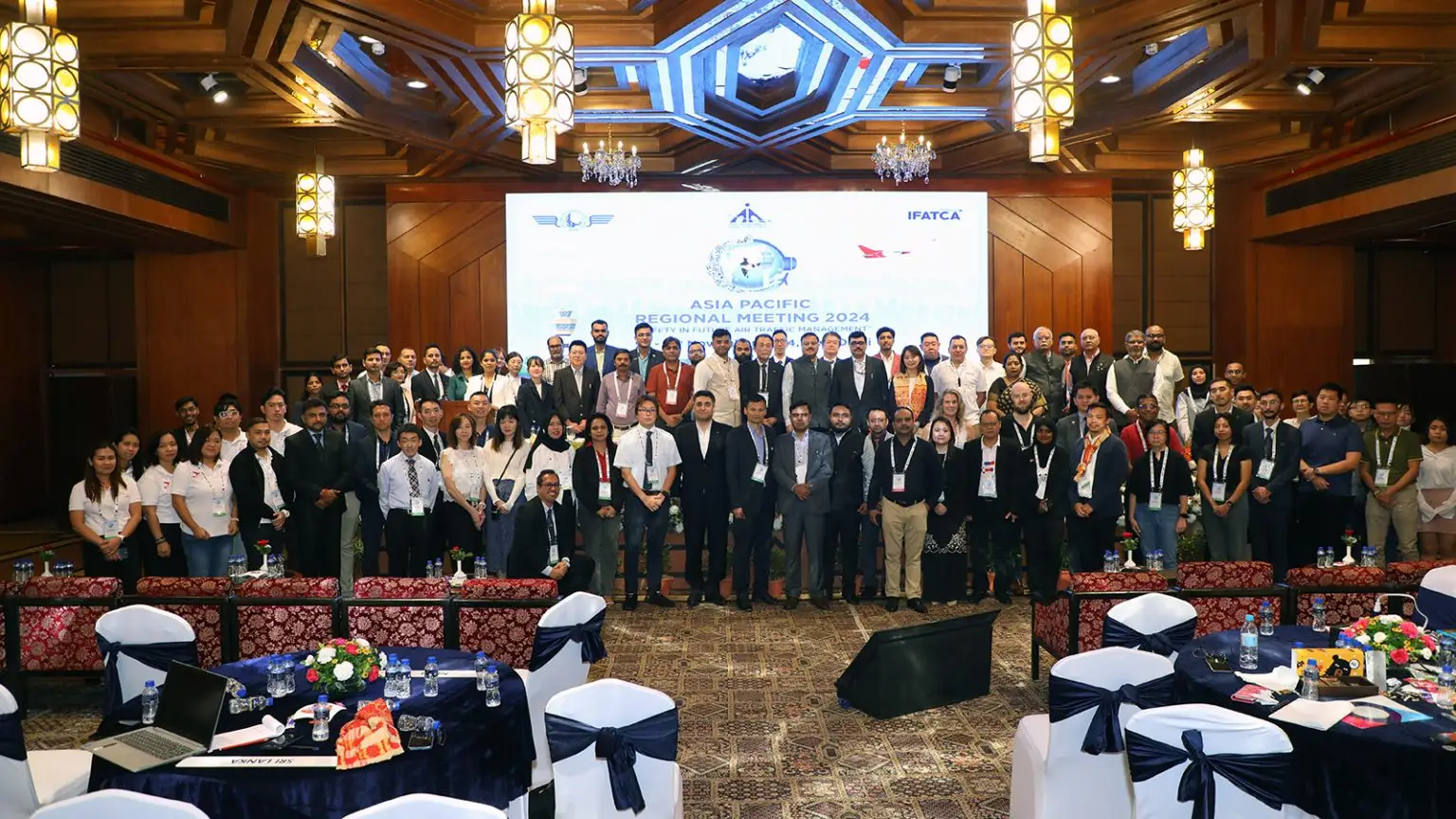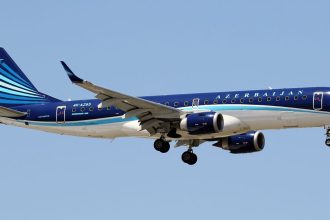New Delhi, India

by Saif Ullah
President, Air Traffic Controllers’ Guild of IndiaThe 40th IFATCA Asia Pacific Regional Meeting (APRM) held in New Delhi, India, from November 9th to 11th, 2024, revolved around the theme “Safety in Future Air Traffic Management”. The event brought together Air Traffic Controllers (ATCOs), ICAO, aviation professionals, and key stakeholders from across the Asia Pacific region to discuss critical issues related to aviation safety, the evolving role of ATCOs, and the future of Air Traffic Management (ATM) systems. The esteemed chief guest, Mr. Vumlunmang Vualnam– Secretary of the Ministry of Civil Aviation (MoCA) India, highlighted the importance of collaborative efforts between governmental bodies and aviation professionals to ensure the safety of air traffic in an increasingly complex airspace environment. Also, Mr. Nikhil Kumar Kanodia– IPS CVO AAI; Mr. Vipin Kumar-Chairman AAI, Dr. Manjit Singh-Deputy Regional Director, ICAO APAC Region; Mr. Frederic Deleau-IFATCA EVP Europe; Mr. Maneesh Kumar-Jt.DG DGCA Dr. Sharad Kumar-Member OPS AAI, along with various Executive Directors were present in the meeting.
The meeting provided a platform to address several vital topics related to future of ATM including discussions on technology, safety, and the changing dynamics of global aviation. These discussions were aligned with the central theme of “Safety in Future Air Traffic Management” and focused on how the region can better ensure safety while managing the future challenges of air traffic control.
ICAO’s Role in the Asia Pacific Region: Key Insights by Dr. Manjit Singh, Deputy Regional Director, ICAO APAC: Dr. Manjit Singh, Deputy Regional Director of ICAO’s Asia Pacific (APAC) Office, highlighted several crucial aspects of ICAO’s work in the region during a key presentation. He emphasized the organization’s strategic efforts to ensure safe, efficient, and sustainable aviation growth across APAC. Looking ahead, ICAO’s new areas of focus include the integration of unmanned aerial systems (UAS) into controlled airspace, enhancing cybersecurity, and addressing emerging technologies like advanced air mobility (AAM). These initiatives are crucial for maintaining safety and efficiency as the aviation landscape evolves. Dr. Singh highlighted several emerging risks facing the region, including GNSS jamming and spoofing, the impact of space weather on satellite navigation systems, and the integration of drones into air traffic. ICAO is actively working to mitigate these risks through enhanced technologies and operational frameworks. Finally, Dr. Singh emphasized ICAO’s ongoing efforts in safety oversight. Through audits, training, and the implementation of safety management systems (SMS), ICAO ensures that aviation operations in the region remain safe, secure, and compliant with global standards.Top of Form
Drone Panel Discussion
The Drone Panel Discussion at the IFATCA Asia Pacific Regional Meeting underscored India’s commitment to fostering innovation while ensuring the safe and regulated integration of drones into its national airspace. The past developments—from the DGCA CAR 2018 to the National UTM Policy Framework—reflect India’s proactive approach to creating a robust regulatory environment for drones. With further advancements in technology and regulation, India is positioning itself as a leader in the drone industry, balancing safety and growth in this dynamic sector.
The various ATM developments and IFATCA involvement in Europe: ATM developments in Europe are shaped by a combination of technological advances, regulatory changes, and ongoing challenges such as staff shortages and the need for sustainable practices. IFATCA plays a critical role in representing the interests of air traffic controllers, ensuring that their concerns are addressed in the development and implementation of new systems and policies. By focusing on staff well-being, technological adaptation, and safety standards, IFATCA continues to support the evolution of ATM in Europe, helping to navigate these challenges while ensuring that air traffic control remains efficient, safe, and sustainable.
Free Route Airspace Operations in Europe: Free Route Airspace (FRA) operations in Europe represent a significant shift in Air Traffic Management, allowing aircraft to plan and fly the most efficient routes through European airspace without being constrained by the limitations of traditional airways. FRA operations enhance flight efficiency, reduce fuel consumption, and improve environmental sustainability. However, these benefits come with their own set of challenges, particularly when it comes to coordination between different ATC centres, managing cross-border issues, and ensuring no single point of failure in the system.
GNSS Jamming and Spoofing: Global Navigation Satellite Systems (GNSS) are crucial to modern aviation, enabling aircraft navigation, positioning, and timing (PNT) information for both flight operations and Air Traffic Management. GNSS jamming and spoofing are growing concerns for aviation, as they can compromise flight safety and disrupt operations. Through case studies and regulatory guidance, it is evident that robust action from air operators, pilots, ANSPs, and ATC is required to mitigate the risks associated with GNSS interference. Regulatory initiatives such as the ANSS AC 01 of 2023 provide a framework for how stakeholders in the aviation industry can work together to ensure safe operations and minimize the impact of GNSS jamming and spoofing incidents on aviation safety. Effective monitoring, training, and coordination are key to safeguarding aviation from these emerging threats.
Aviation Safety: Japan’s Mission to Prevent Future Accidents After the Haneda Crash: A poignant discussion took place on aviation safety and the importance of learning from past accidents, such as the Haneda crash. Japan’s comprehensive efforts to review and revise safety standards in response to the crash were presented as a model of how the aviation industry can turn tragedy into a platform for better safety practices. The investigation is still pending and must be resolved.
ACDM (Airport Collaborative Decision Making): The deployment of Airport Collaborative Decision Making (ACDM) in India is a significant step toward optimizing airport operations, improving flight efficiency, and reducing delays. While there are challenges in the integration of various stakeholders, technological upgrades, and training, solutions are being put in place to address these issues. With the continued efforts of the Airports Authority of India (AAI) and collaboration between all aviation stakeholders, ACDM is poised to transform India’s airport operations and contribute to safer, more efficient Air Traffic Management.
IFATCA Information Sessions
1. IFATCA Basics by Cheryl Chen and Greg Okeroa.
2. DeWei Lim introduced the IFATCA 2030+ Task Force, an initiative aimed at shaping the future of air traffic control and ensuring that the profession evolves in line with industry changes and technological advancements.
3. Greg Okeroa gave an update on the work of IFATCA’s Equity, Diversity and Inclusion Task Force (EDITF) and the work the TF had been doing while mindful of the needs of the region.
4. The session also explored the topic of IFATCA Communication Coordination-By Umi Syahirah, discussing how the organization keeps its members informed and ensures effective communication among its global network of air traffic controllers.
Executive Vice President (EVP) Report-By-Cheryl Chen followed by all the 4 Regional Vice President (RVP) Submitted their Reports.
- Nyamgerel Dashdolgor (Nainaa)- Regional Vice-President North Asia
- Lim De Wei-Regional Vice-President South-East Asia
- Saiffullah-Regional Vice-President South-West Asia
- Greg Okeroa-Regional Vice-President Pacific.
MA Reports was also done by individual countries: Various achievements and issues were discussed. Delay in investigation was common in all report -as requested by the host country India; Mental health was promoted and was welcomed by all.
EVP Election for 2024-2026 Term
The EVP (Executive Vice President) ASP Region election was another significant highlight. Cheryl Chen from ROCATCA (Republic of China Air Traffic Controllers’ Association – Taiwan) emerged victorious in the election, marking a new chapter for the IFATCA Asia Pacific regional leadership. The election results were seen as a positive step forward in strengthening the voice of ATCOs in the region.
The 40th IFATCA Asia Pacific Regional Meeting (APRM), held in New Delhi, India in November 2024, concluded with significant developments regarding the future of the event.
2025 IFATCA APRM in Macao:
The 2025 IFATCA APRM will be hosted in Macao, marking an exciting opportunity for the region. During the closing of the 2024 meeting, the India ATC Guild officially handed over the IFATCA flag to the representatives from Macao. This symbolic gesture signified the smooth transition of responsibilities, and Macao will be preparing to host the next major regional event in 2025.
2026 IFATCA APRM in Japan
Looking ahead, Japan has won the bid to host the 2026 IFATCA APRM. Interestingly, there was no opposition to Japan’s bid, indicating broad support for the country to hold the event. This reflects the confidence in Japan’s capacity to organize a successful meeting and its growing role in the aviation sector. The 2026 IFATCA APRM in Japan is set to be a significant event for the Asia Pacific region, offering an opportunity for continued collaboration and growth in air traffic control standards and practices.
The conclusion of the 40th IFATCA APRM 2024 also served as a moment of reflection on the achievements of the Asia Pacific region in Air Traffic Management and the collective efforts of air traffic controllers and aviation professionals. The handover of the flag to Macao and the announcement of Japan as the 2026 host marked the end of a successful and productive meeting, with renewed energy for future gatherings in the region.







